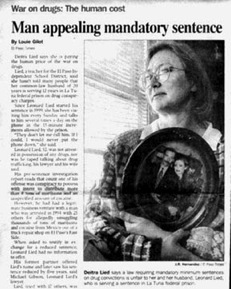Leonard Lied -- #63525-080
12 Years -- Drug Conspiracy
 War on Drugs: The Human Cost
War on Drugs: The Human Cost
Man Appealing Mandatory Sentence
By Louie Gilot, El Paso Times (2002)
Deitra Lied says she is paying the human price of the war on drugs. Lied, a teacher for the El Paso Independent School District, said she hasn't told many people that her common-law husband of 20 years is serving 12 years in La Tuna federal prison on drug conspiracy charges.
Since Leonard Lied started his sentence in 1999, she has been visiting him every Sunday and talks to him several times a day on the phone in the 15-minute increments allowed by the prison. "The don't let me call him. If I could, I would never put the phone down," she said.
Leonard Lied, 52, was not arrested in possession of any drugs, nor was he taped talking about drug trafficking, his lawyer and his wife said. His pre-sentence investigation report reads that count one of his offense was conspiracy to possess with intent to distribute more than 8 tons of marijuana and an unspecified amount of cocaine.
However, he had had a legitimate business venture with a man who was arrested in 1994 with 25 others for allegedly smuggling thousands of tons of marijuana and cocaine from Mexico out of a truck repair shop on El Paso's East Side. When asked to testify in exchange for a reduced sentence, Leonard Lied had no information to offer.
His former partner offered Lied's name and later saw his sentence reduced by five years, said Michael Gibson, Leonard Lied's lawyer. Lied, tried with 17 others, was found guilty on "some snitch's word," Gibson said. "The problem you have with these cases is they lump everybody together; it's a spillover effect," Gibson said. Leonard Lied is appealing the verdict.
The Anti-Drug Abuse Act of 1986 established federal mandatory minimum prison sentences in drug cases, based solely on the type and quantity of the drug involved. In 1988, the status was amended to add "conspiracy" to the list of the offenses covered.
Minor players in drug conspiracies can end up serving longer sentences than kingpins, sometimes even longer than convicted rapists, activists said. The federal war on drugs weighs financially on local governments when it comes to prosecution and detention, officials said.
Last year, the District Attorney's Office calculated that prosecuting federal drug offenders in El Paso cost local taxpayers $8 million a year and was successful in obtaining more than $4 million in reimbursement.
12 Years -- Drug Conspiracy

Man Appealing Mandatory Sentence
By Louie Gilot, El Paso Times (2002)
Deitra Lied says she is paying the human price of the war on drugs. Lied, a teacher for the El Paso Independent School District, said she hasn't told many people that her common-law husband of 20 years is serving 12 years in La Tuna federal prison on drug conspiracy charges.
Since Leonard Lied started his sentence in 1999, she has been visiting him every Sunday and talks to him several times a day on the phone in the 15-minute increments allowed by the prison. "The don't let me call him. If I could, I would never put the phone down," she said.
Leonard Lied, 52, was not arrested in possession of any drugs, nor was he taped talking about drug trafficking, his lawyer and his wife said. His pre-sentence investigation report reads that count one of his offense was conspiracy to possess with intent to distribute more than 8 tons of marijuana and an unspecified amount of cocaine.
However, he had had a legitimate business venture with a man who was arrested in 1994 with 25 others for allegedly smuggling thousands of tons of marijuana and cocaine from Mexico out of a truck repair shop on El Paso's East Side. When asked to testify in exchange for a reduced sentence, Leonard Lied had no information to offer.
His former partner offered Lied's name and later saw his sentence reduced by five years, said Michael Gibson, Leonard Lied's lawyer. Lied, tried with 17 others, was found guilty on "some snitch's word," Gibson said. "The problem you have with these cases is they lump everybody together; it's a spillover effect," Gibson said. Leonard Lied is appealing the verdict.
The Anti-Drug Abuse Act of 1986 established federal mandatory minimum prison sentences in drug cases, based solely on the type and quantity of the drug involved. In 1988, the status was amended to add "conspiracy" to the list of the offenses covered.
Minor players in drug conspiracies can end up serving longer sentences than kingpins, sometimes even longer than convicted rapists, activists said. The federal war on drugs weighs financially on local governments when it comes to prosecution and detention, officials said.
Last year, the District Attorney's Office calculated that prosecuting federal drug offenders in El Paso cost local taxpayers $8 million a year and was successful in obtaining more than $4 million in reimbursement.
